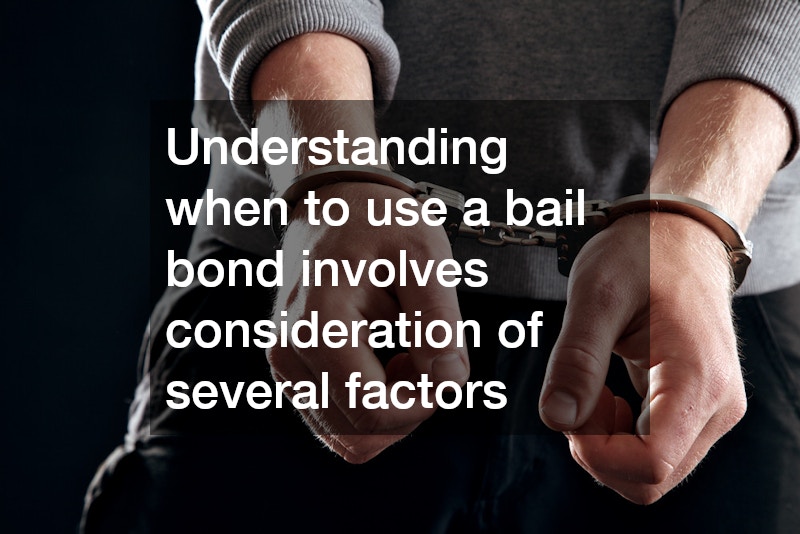Bail bonds are a financial guarantee that allows a defendant to be released from jail while awaiting trial. They serve the purpose of ensuring that the defendant appears for their court hearings, offering a way to avoid staying in jail for extended periods before trial.
Considering a bail bond is often due to the inability to pay the total bail amount set by the court. This mechanism not only helps the defendant but also provides peace of mind to their family and friends, knowing that their loved one is not behind bars during this challenging time.
This article will delve into the intricacies of bail bonds, highlighting the process, responsibilities, and situations where they are beneficial. Understanding these aspects will help individuals decide whether a bailbond should be pursued.
How Do Bail Bonds Work?
The Process of Obtaining a Bail Bond
The initial step in acquiring a bail bond involves contacting a licensed bail bond agent. This professional guides the defendant or their family through the necessary paperwork and legal requirements to secure the bond.
Once contacted, the agent explains the terms and conditions associated with the bail bond, including fees typically amounting to 10% of the total bail amount. Before securing the bond, an agreement form is signed, establishing the legal obligations of the involved parties.
After agreements are signed, the agent provides the court with the bond, allowing the defendant’s release. This process is usually swift, easing the defendant’s return to their daily routine while awaiting trial.
Responsibilities and Obligations
Once a bail bond is in place, the defendant is obligated to attend all court proceedings diligently. Missing any court date could lead to forfeiture of the bail and potential arrest, making it crucial for the defendant to maintain good communication with both their attorney and the bail bond agency.
The indemnitor, generally a family member or friend who co-signs the bond, also bears significant responsibility. They ensure that the defendant adheres to the court’s requirements and attends all mandated appearances.
Both parties must adhere to the agreed-upon terms to prevent dire legal consequences. Collaboration with the bail bond agency is key to navigating the legal landscape during this challenging time.
When Should You Consider a Bail Bond?
Financial Considerations
Financial constraints often guide the decision to utilize a bail bond rather than paying the full bail amount directly to the court. Bail amounts can be substantial, putting a strain on personal finances, which a bail bond alleviates by only requiring a small percentage upfront.
In leveraging a bail bond, defendants preserve their savings for legal fees or family needs during the ongoing trial. Paying for a bond might also improve liquidity, helping in managing other financial commitments efficiently.
Choosing a bail bond can be an economical decision, allowing defendants to focus resources on preparing a robust legal defense. The structured payment terms also provide financial relief during prolonged legal processes.
Legal and Personal Situations
Several scenarios might necessitate considering a bail bond, such as the severity of charges or perceived flight risk. Utilizing a bail bond can ensure stability, allowing defendants to work and care for their families during the trial phase.
For those facing minor charges, opting for a bail bond might expedite release, keeping disruption to a minimum. It also aids individuals with significant community ties but limited financial means, ensuring they don’t face undue hardship during the legal process.
Personal circumstances, such as health issues or family responsibilities, can significantly impact the decision. By using a bail bond, defendants secure time and opportunity to address these personal matters while awaiting trial.
Understanding when to use a bail bond involves evaluating financial, legal, and personal considerations. A bail bond can relieve immediate financial burdens and allow defendants to maintain daily responsibilities while awaiting trial. However, it’s crucial to weigh the costs and commitments that come with securing a bond, such as the non-refundable fees paid to the bail bond agent and the potential for additional liabilities if the defendant fails to appear in court.
This detailed analysis of bail bonds aims to empower individuals facing legal challenges, guiding them toward informed decisions. Whether the choice is motivated by financial constraints, the need to avoid prolonged detention, or a desire to focus on building a strong legal defense, understanding the nuances of bail bonds is essential. Consulting with legal professionals and trusted advisors can also provide clarity and support during what can be a stressful time.
Ultimately, the right choice hinges on individual circumstances and the opportunity to navigate the legal system effectively. By carefully considering the options available, individuals can make decisions that align with their immediate needs and long-term goals, ensuring they are better prepared to face the legal process with confidence and resolve.



